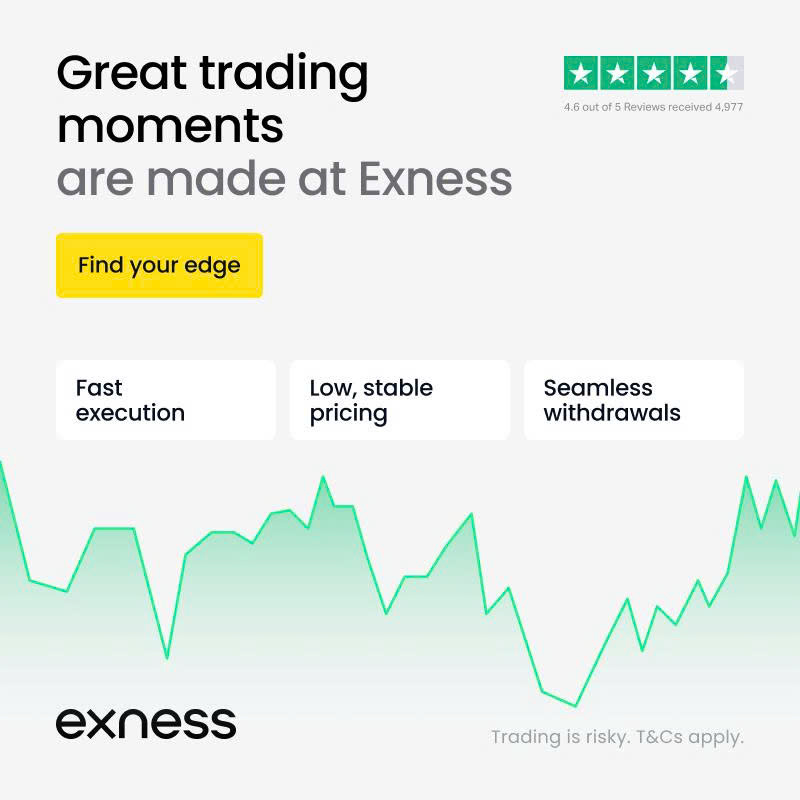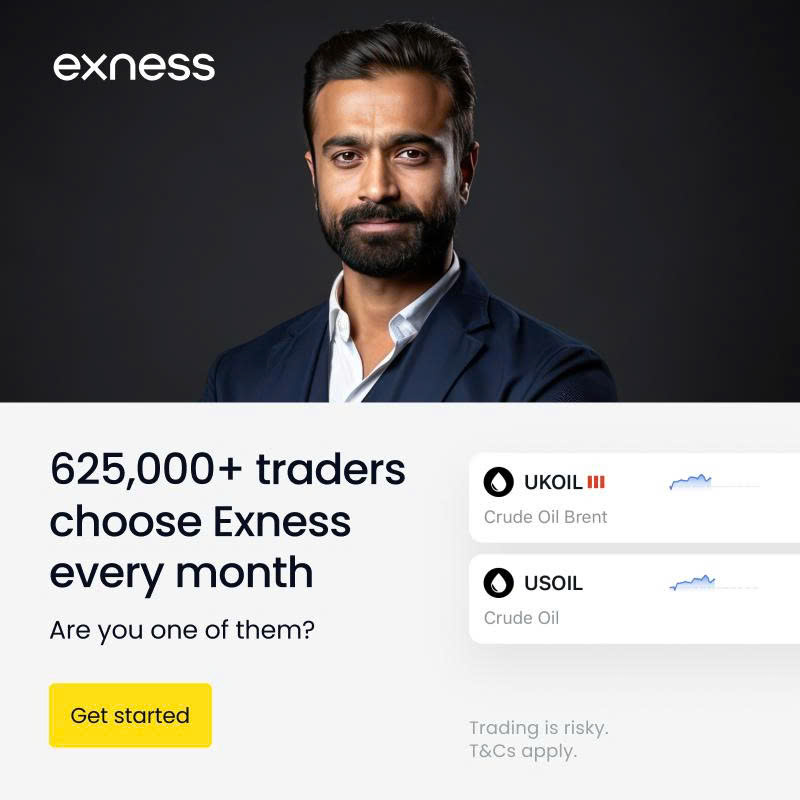
7 minute read
Is Exness Banned in Dubai? The Truth for Traders in 2025
from Exness
by Exness Blog
If you’re a trader in Dubai wondering, “Is Exness banned in Dubai?” the short answer is no, Exness is not banned in Dubai. You can legally trade with Exness in the UAE, but there’s a catch depending on where you’re trading from and the regulatory nuances of the region. In this article, I’ll break down everything you need to know about Exness’s legal status in Dubai, its regulatory framework, why it’s a popular choice for traders, and what you should consider before signing up. Let’s dive in!

✅ Trade with Exness now: Open An Account or Visit Brokers 👈
Understanding Exness: A Quick Overview
Exness is a globally recognized forex and CFD broker, founded in 2008, with a reputation for competitive spreads, fast withdrawals, and user-friendly platforms like MetaTrader 4 (MT4) and MetaTrader 5 (MT5). It serves over 800,000 active clients worldwide, handling a staggering $4 trillion in monthly trading volume. For UAE traders, Exness offers appealing features like Islamic (swap-free) accounts, Arabic support, and local payment methods. But the big question remains: is it legal to use Exness in Dubai?
The UAE’s Financial Regulatory Landscape
To understand Exness’s legality, we first need to look at the UAE’s financial regulations, which are strict but well-structured to protect traders. The UAE has two primary regulatory bodies overseeing financial activities:
Dubai Financial Services Authority (DFSA): This body regulates financial services within the Dubai International Financial Centre (DIFC), a financial free zone in Dubai. Any broker operating in the DIFC must hold a DFSA license, which comes with rigorous requirements like client fund segregation and regular audits.
Securities and Commodities Authority (SCA): The SCA oversees financial markets across the mainland UAE, outside the DIFC. It licenses forex brokers and ensures compliance with local laws.
Central Bank of the UAE (CBUAE): While primarily focused on banking, the CBUAE also regulates foreign exchange transactions and ensures financial stability across the UAE.
These authorities create a robust framework to ensure transparency, security, and fairness in the financial markets. So, where does Exness fit into this?
Is Exness Regulated in the UAE?
Here’s the deal: Exness is not regulated by the DFSA or SCA, meaning it doesn’t hold a local UAE license. However, this doesn’t make it illegal for Dubai residents to trade with Exness. Exness operates under international licenses from reputable regulators, including:
Cyprus Securities and Exchange Commission (CySEC): Ensures compliance with EU financial standards.
Financial Conduct Authority (FCA) in the UK: Known for stringent investor protection measures.
Financial Services Authority (FSA) in Seychelles: Regulates Exness’s operations in select jurisdictions.
Financial Sector Conduct Authority (FSCA) in South Africa, and others in Mauritius, Kenya, and the British Virgin Islands.
These global licenses ensure Exness adheres to international standards, such as segregating client funds, implementing anti-money laundering (AML) protocols, and maintaining transparency. For traders outside the DIFC, Exness operates legally under these international regulations, and UAE laws don’t explicitly prohibit residents from using offshore brokers like Exness.
Key takeaway: Exness is legal for traders in mainland Dubai and other emirates, but if you’re trading from within the DIFC, you might face regulatory risks since Exness lacks a DFSA license.

✅ Trade with Exness now: Open An Account or Visit Brokers 👈
Why Exness Is Popular Among Dubai Traders
Despite not having a local UAE license, Exness is a top choice for traders in Dubai. Here’s why:
Competitive Trading Conditions: Exness offers spreads starting at 0.0 pips on certain accounts (like the Raw Spread or Zero account) and high leverage up to 1:2000, which is attractive for experienced traders. However, high leverage comes with risks, so beginners should tread carefully.
Instant Withdrawals: Exness is known for its lightning-fast withdrawals, often processed instantly via methods like e-wallets (Skrill, Neteller), bank cards, or cryptocurrencies (Bitcoin, Tether). No withdrawal fees make it even more appealing.
Islamic Accounts: For Muslim traders in the UAE, Exness provides swap-free accounts that comply with Sharia law, automatically applied for clients from Islamic countries.
User-Friendly Platforms: Traders can choose between MT4, MT5, or the Exness Web Terminal, which integrates with TradingView for advanced charting. The Exness mobile app also makes trading on the go seamless.
Localized Support: Exness offers 24/7 customer support in Arabic and English, along with UAE-friendly payment methods like Emirates NBD, Mashreq Bank, and local bank transfers.
Low Minimum Deposit: You can start trading with as little as $10, making Exness accessible for beginners.
These features make Exness a compelling option, but you still need to understand the regulatory nuances before diving in.
Risks and Considerations for Dubai Traders
While Exness is legal in Dubai, there are a few things to keep in mind:
No DFSA Regulation: If you’re trading from the DIFC, Exness isn’t authorized to operate there, which could pose risks. Stick to DFSA-regulated brokers if you’re in the DIFC.
Offshore Broker Risks: Although Exness is regulated by reputable international bodies, offshore brokers may not offer the same level of investor protection as locally licensed ones. For example, the UAE’s dispute resolution mechanisms might not apply.
High Leverage Risks: Exness’s high leverage (up to 1:2000) can amplify profits but also losses. Make sure you understand the risks before using high leverage.
Tax Implications: Good news—Dubai doesn’t impose income tax on trading profits for individuals, so you can keep what you earn. However, always consult a tax professional to stay compliant.
To mitigate risks, ensure you verify your account with Exness (through AML and KYC processes) and only deposit funds you can afford to lose. Forex and CFD trading is inherently risky, and Exness’s transparency about this is a good sign of its legitimacy.
How to Start Trading with Exness in Dubai
Ready to give Exness a try? Here’s a quick guide to get started:
Sign Up: Visit the Exness website and open an account. The process is straightforward and takes just a few minutes.
Verify Your Account: Submit your ID and proof of address to comply with AML and KYC regulations.
Choose an Account Type: Exness offers Standard, Standard Cent (for beginners), and Professional accounts (Raw Spread, Zero, Pro). Pick one that suits your trading style.
Deposit Funds: Use UAE-friendly methods like bank transfers (Emirates NBD, Mashreq), e-wallets (Skrill, Neteller), or cryptocurrencies. The minimum deposit is as low as $10.
Download a Platform: Install MT4, MT5, or use the Exness Web Terminal for trading.
Start Trading: Explore forex, commodities, indices, stocks, or crypto CFDs with Exness’s tight spreads and high leverage.
Pro tip: Start with a demo account to test the platform risk-free before committing real funds.
Is Exness Safe and Legit?
Exness’s global licenses, client fund segregation, negative balance protection, and membership in the Financial Commission (offering up to €20,000 in compensation per client in case of insolvency) make it a trustworthy broker. It’s been operating since 2008 with a clean track record and serves millions of traders worldwide. While it’s not locally regulated in the UAE, its international oversight from regulators like the FCA and CySEC provides a strong level of credibility.
Alternatives to Exness in Dubai
If you’re hesitant about using an offshore broker, consider DFSA-regulated brokers like:
IG Group: Known for its robust regulation and wide range of instruments.
Saxo Bank: Offers a premium trading experience with DFSA oversight.
Axi: A popular choice for forex traders with competitive spreads.
These brokers are fully compliant with UAE regulations but may have higher fees or stricter account requirements compared to Exness.
Final Verdict: Should You Trade with Exness in Dubai?
So, is Exness banned in Dubai? No, it’s not. Exness is legal for UAE residents outside the DIFC, thanks to its international regulations and compliance with global standards. Its competitive trading conditions, low fees, and UAE-friendly features like Islamic accounts and local payment methods make it a top choice for many traders. However, if you’re in the DIFC or prefer a locally regulated broker, you might want to explore DFSA-licensed alternatives.
Before you start, weigh the risks of trading with an offshore broker and ensure you’re comfortable with Exness’s regulatory status. If you’re looking for a reliable, cost-effective platform with a strong global reputation, Exness is worth considering.
✅ Trade with Exness now: Open An Account or Visit Brokers 👈
Read more:










